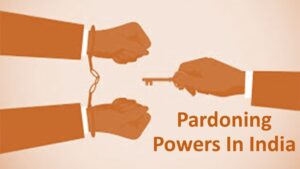Table of Contents
INTRODUCTION
The Constitution of India contains the Pardoning Powers in India But also provides for the exercise of power to grant reprieves, respite, Remission, and commutation of a sentence. All these powers can be exercised by the President of India and the Governors of the concerned State
Article 72 of the Indian Constitution deals with the Pardoning Powers of the President of India. When the President of India takes action over the case of punishment or the sentence of any person convicted of an offense, it takes the form of his pardoning powers. Article 161 mentions the Pardoning Power of the Governor.
Mercy pleas, pardons, and all communications for acts of mercy to and from the state executive, the President of India, and governors of states in India’s case. It is the most common route opted by prisoners on death row or convicted for an offense with a death penalty to convert the said death penalty into life imprisonment.
Types Of Pardoning Power
There are five types of pardoning powers mentioned in Article 727 and Article 1618 of the Indian Constitution
- Pardon
- Respite
- Reprieve
- Remit
- Commute

Pardon
When the President pardons, both the sentence and the conviction of the convict completely absolve the sentences, punishments and disqualifications
Respite
When the President uses the pardoning power of ‘Respite’, he chooses to award a lesser sentence in place of one originally awarded to the convict. For example, due to some special fact, such as the physical disability of a convict or the pregnancy of a woman offender, the President can use this power.
Reprieve
When the President chooses the pardoning power of ‘Reprieve’; he stays the execution of a sentence (especially that of death) for a temporary period. By doing this, he enables the convict to have time to seek pardon or commutation from him
Remit
When the President chooses the pardoning power of Remit, he acts to reduce the period of the sentence, but the character of the sentence remains the same. For example, a sentence of rigorous imprisonment for two years may be remitted to rigorous imprisonment for one year but the imprisonment remains rigorous.
Commute
When the President chooses to use this pardoning power of ‘Commute; he substitutes one form of punishment for a lighter form. For example, a death sentence may be commuted to rigorous imprisonment, which in turn may be commuted to simple imprisonment.
Pardoning Power Of President In India
The power of the Presidential Pardon is found in Article 72 of the Indian Constitution. It states the Power of the President to grant pardons, etc, and to suspend, remit or commute sentences in certain cases:
- The President shall have the power to grant pardons, reprieves, respites, or remissions of punishment or to suspend, remit or commute the sentence of any person convicted of any offense:
- In all cases where the punishment or penalty is by a Court Martial;
- In all cases where the punishment or sentence is for an offence against any law relating to a matter to which the executive power of the Union extends;
- In all cases where the sentence is a sentence of death
- Nothing in subclause (a) of Clause (1 ) shall affect the power to suspend, remit or commute a sentence of death exercisable by the State Governor under any law for the time being in force.
Pardoning Power Of Governor
Article 161 mentions the Pardoning Power of the Governor. It states:
The Governor of a State shall have the power to grant pardons, reprieves, respites or remissions of punishment or to suspend, remit or commute the sentence of any person convicted of any offence against any law relating to a matter to which the executive power of the State extends.
When a convict has committed an offence against state law, the concerned punishment can be granted a pardon, reprieve, respite, and remission by the Governor of the state.
Governor’s power to pardon overrides a provision in the Code of Criminal Procedure – Section 433A -which mandates that a prisoner’s sentence can be remitted only after 14 years of jail, a Bench of Justices Hemant Gupta and A.S. Bopanna observed in a judgment
Revocation of Pardon
This is quite possible that the pardon granted by the executive may Be revoked or withdrawn. The question of revocation may come up for the Consideration of the executive in two cases.
The very first case where the Pardon can be revoked is one when the pardon itself is obtained by fraud, Misrepresentation or misinformation. In other words, a pardon procured by False and fraudulent representation or an intentional suppression of the Truth is void, even though the person pardoned had no part in perpetrating the fraud.
The second one is in case of violation of the condition Imposed by the executive on the person seeking pardon. As a matter of Fact, a pardon can either be free or conditional. The fulfillment of the Condition is always necessary and the breach of the same can always put The person behind the bars once again.
CONCLUSION
Besides Articles 72 and 161 of the Constitution of India, provisions in the CrPC, 1973, prison laws, guidelines issued by the National Human Rights Commission, instructions issued from time to time by the Central and State Governments, and local laws enacted by State Legislatures also apply to the matter of pardon, etc.
MUST READ
MARRIAGE UNDER MUSLIM PERSONAL LAW
